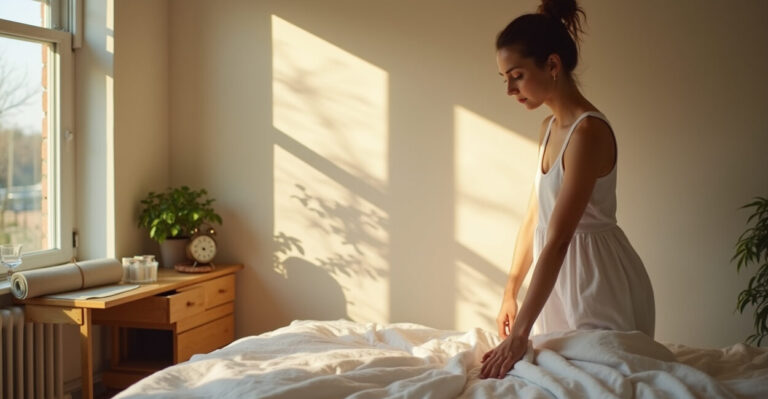Warning: Cannot modify header information - headers already sent in /home/u278635817/domains/mymorninglife.com/public_html/wp-content/plugins/artigosgpt/artigosgpt.php on line 29509
Warning: Cannot modify header information - headers already sent in /home/u278635817/domains/mymorninglife.com/public_html/wp-content/plugins/artigosgpt/artigosgpt.php on line 29509
Imagine waking up to a room bathed in warm, gentle sunlight. That flood of morning natural light doesn’t just brighten your space—it brightens your mood, sharpens your focus, and sets the tone for your entire day. The simple act of letting the morning sun in can transform not just your environment but your emotional well-being.
In today’s digitally saturated world, artificial lights and screens dominate our lives, often disrupting our natural rhythms. Yet, exposure to natural morning light remains one of the most effective, accessible ways to reset your internal clock and lift your spirits. Understanding why this light matters can help you harness its power to boost your energy and mental health.
In this article, you’ll discover the science behind morning natural light, its impact on mood and energy, and practical ways to invite more of it into your daily routine for lasting wellness.
Contents
ToggleThe Science Behind Morning Natural Light
How Light Influences Your Brain Chemistry
Morning natural light triggers the release of serotonin, the brain’s “feel-good” chemical that enhances mood and focus. This biochemical reaction helps explain why sunny mornings often feel uplifting.
Exposure to natural light also reduces melatonin production, the hormone that induces sleepiness, helping you wake up alert and ready for the day.
The Role of Circadian Rhythms
Your body runs on a 24-hour internal clock called the circadian rhythm, which is heavily influenced by light exposure. Morning sunlight acts as a natural cue, synchronizing this rhythm to promote healthy sleep and wake cycles.
Disruptions in circadian rhythms are linked to mood disorders and fatigue, highlighting the importance of morning natural light in maintaining emotional balance.
Natural Light vs. Artificial Light
Natural morning light offers a full spectrum of wavelengths, unlike artificial lighting that often lacks important blue light components essential for circadian regulation.
This makes morning natural light uniquely effective in elevating mood and energy compared to indoor lighting or screen exposure.
Morning Natural Light and Mental Health
Reducing Symptoms of Depression
Regular exposure to morning natural light can ease symptoms of seasonal affective disorder (SAD) and other forms of depression by boosting serotonin and regulating sleep.
Light therapy mimics this effect but nothing beats the natural, balanced energy of the morning sun.
Enhancing Emotional Resilience
Consistent morning light exposure supports emotional regulation, helping you manage stress and anxiety more effectively throughout the day.
This natural boost creates a foundation for better mental health and overall well-being.
Improved Cognitive Function
Morning natural light sharpens attention and memory by stimulating brain areas responsible for cognitive processing.
This effect can enhance productivity and mood, especially during demanding morning hours.
How Morning Natural Light Boosts Energy Levels
Activating Your Body’s Wake-Up Signals
Sunlight in the morning signals your body to reduce melatonin and increase cortisol, hormones that promote alertness and energy.
This natural hormone balance jumpstarts your metabolism and prepares you physically for the day ahead.
Supporting Healthy Sleep Patterns
Exposure to morning natural light helps regulate your sleep-wake cycle, improving sleep quality and ensuring you wake up feeling refreshed.
Better sleep translates directly into higher daytime energy and vitality.
Combating Midday Slumps
Starting your day with natural light exposure reduces the likelihood of energy crashes by maintaining a steady circadian rhythm.
It keeps your body aligned with natural daylight, preventing fatigue and boosting stamina.
Incorporating Morning Natural Light Into Your Routine
Maximize Window Time
Open your curtains or blinds first thing in the morning to let sunlight flood your living space naturally.
Position your breakfast spot or workspace near a window to soak up more light during early hours.
Step Outside Daily
Spend at least 20–30 minutes outdoors each morning to experience full-spectrum sunlight.
Even a short walk or coffee on the porch can significantly enhance your mood and energy.
Optimize Your Home Lighting
Choose daylight-simulating bulbs for indoor use when natural light is limited.
Combine these with window treatments that let light in while reducing glare.
Designing Your Space for Optimal Morning Natural Light
Strategic Window Placement
Rooms facing east receive the most beneficial morning sunlight, perfect for bedrooms or kitchens.
Consider this when planning home layouts or rearranging furniture.
Use Reflective Surfaces
Light-colored walls, mirrors, and glossy finishes can amplify natural light, brightening your space.
This design trick maximizes the effect of available morning natural light indoors.
Minimal Window Coverings
Choose sheer curtains or blinds that allow light penetration while maintaining privacy.
Avoid heavy drapes that block valuable morning sun rays.
Morning Natural Light and Physical Health Benefits
Vitamin D Synthesis
Sunlight exposure triggers vitamin D production, essential for bone health, immunity, and mood regulation.
Morning hours provide a safe window for this vital nutrient synthesis.
Boosting Immune Function
Natural light helps regulate immune responses and reduces inflammation, contributing to overall wellness.
Consistent morning exposure strengthens your body’s defense mechanisms.
Supporting Eye Health
Natural light encourages healthy pupil constriction and reduces eye strain common with artificial light.
It also helps maintain healthy vision and prevents myopia progression, especially in children.
Step-by-Step: How to Harness Morning Natural Light Daily
- Wake up 15 minutes earlier to catch the first light.
- Open your curtains or blinds immediately after getting up.
- Spend 20 minutes outside or by a bright window.
- Enjoy your morning routine (breakfast, reading) near natural light.
- Arrange your workspace to face or be near a window.
- Use daylight bulbs indoors when natural light is unavailable.
Conclusion
Morning natural light is more than just illumination—it’s a natural mood enhancer, an energy booster, and a vital component of your biological rhythm. By intentionally welcoming sunlight into your mornings, you tap into a powerful, free resource for emotional and physical well-being. The next time you pull back your curtains, remember: you’re not just letting light in; you’re inviting a brighter, healthier day.
Frequently Asked Questions
How much morning natural light do I need daily?
Experts recommend around 20 to 30 minutes of morning natural light exposure each day to effectively regulate your circadian rhythm, boost mood, and support vitamin D synthesis. Even on cloudy days, natural light is beneficial compared to artificial lighting.
Can morning natural light help with sleep problems?
Yes, morning natural light helps reset your internal clock by suppressing melatonin during the day and promoting its release at night, leading to better sleep quality and more consistent sleep patterns.
Is outdoor exposure necessary, or is indoor light enough?
While natural light through windows is helpful, outdoor exposure provides more intense and full-spectrum light, which is more effective for mood and circadian regulation. Aim for outdoor time when possible.
What if I live in a place with limited sunlight?
In low-light environments, consider light therapy lamps designed to mimic morning natural light. These can supplement natural exposure and help maintain your circadian rhythm and mood.
Does morning natural light affect children differently?
Children benefit significantly from morning natural light, which supports healthy eye development, regulates sleep, and improves mood and concentration. Encouraging outdoor morning play is especially beneficial.
For more insights on natural light and mental wellness, visit Sleep Foundation and Healthline.
More Articles




























